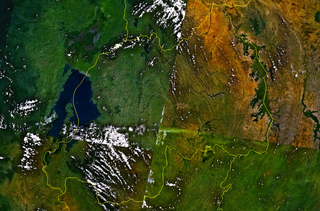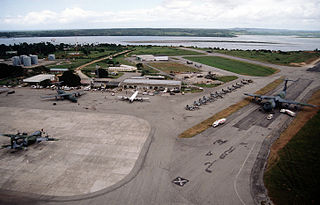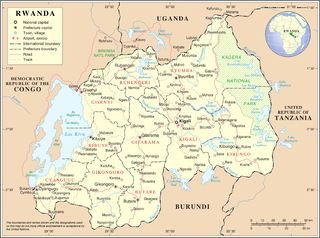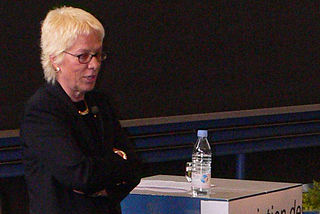
The International Criminal Tribunal for Rwanda was an international court established in November 1994 by the United Nations Security Council in Resolution 955 in order to adjudicate people charged for the Rwandan genocide and other serious violations of international law in Rwanda, or by Rwandan citizens in nearby states, between 1 January and 31 December 1994. The court eventually convicted 61 individuals and acquitted 14.

United Nations Security Council resolution 893, adopted unanimously on 6 January 1994, after reaffirming resolutions 812 (1993), 846 (1993), 872 (1993) and 891 (1993) on Rwanda, the Council noted that the situation in Rwanda could have implications for neighbouring Burundi and authorised the deployment of a second military battalion of the United Nations Assistance Mission for Rwanda (UNAMIR) to the demilitarised zone.

United Nations Security Council resolution 935, adopted unanimously on 1 July 1994, after recalling all resolutions on Rwanda, particularly 918 (1994) and 925 (1994), the Council requested the Secretary-General Boutros Boutros-Ghali to establish a Commission of Experts to investigate violations of international humanitarian law during the Rwandan genocide.

United Nations Security Council resolution 955, adopted on 8 November 1994, after recalling all resolutions on Rwanda, the Council noted that serious violations of international humanitarian law had taken place in the country and, acting under Chapter VII of the United Nations Charter, established the International Criminal Tribunal for Rwanda (ICTR).

United Nations Security Council resolution 965, adopted unanimously on 30 November 1994, after reaffirming all resolutions on the situation in Rwanda, particularly resolutions 872 (1993), 912 (1994), 918 (1994), 925 (1994) and 955 (1994), the Council extended the mandate of the United Nations Assistance Mission for Rwanda (UNAMIR) until 9 June 1995 and expanded its operations.

United Nations Security Council resolution 977, adopted unanimously on 22 February 1995, after recalling Resolution 955 (1994) in which the council was to determine the seat of the International Criminal Tribunal for Rwanda (ICTR) and noting a report by the Secretary-General Boutros Boutros-Ghali, the council decided that its seat would be in Arusha, Tanzania.

United Nations Security Council resolution 978, adopted unanimously on 27 February 1995, after recalling all previous resolutions on Rwanda, including 935 (1994) and 955 (1994), the Council instructed Member States on the arrest and detention of persons responsible for acts during the Rwandan genocide, within the jurisdiction of the International Criminal Tribunal for Rwanda (ICTR).

United Nations Security Council resolution 997, adopted unanimously on 9 June 1995, after reaffirming all resolutions on the situation in Rwanda, particularly resolutions 872 (1993), 912 (1994), 918 (1994), 925 (1994), 955 (1994) and 965 (1994), the Council extended the mandate of the United Nations Assistance Mission for Rwanda (UNAMIR) until 8 December 1995 and adjusted its operations from peacekeeping to confidence-building.

United Nations Security Council resolution 1029, adopted unanimously on 12 December 1995, after recalling previous resolutions on Rwanda, including Resolution 872 (1993), Resolution 912 (1994), Resolution 918 (1994), Resolution 925 (1994), Resolution 955 (1994), Resolution 965 (1994), Resolution 978 (1995) and Resolution 997 (1995), the Council extended the mandate of the United Nations Assistance Mission for Rwanda (UNAMIR) for a final time, ending 8 March 1996, and adjusted its mandate.

United Nations Security Council resolution 1047, adopted unanimously on 29 February 1996, after recalling resolutions 808 (1993), 827 (1993), 936 (1994) and 955 (1994), the Council appointed Louise Arbour as Prosecutor at the International Criminal Tribunal for Rwanda (ICTR) and the International Criminal Tribunal for the former Yugoslavia (ICTY).

United Nations Security Council resolution 1050, adopted unanimously on 8 March 1996, after recalling all previous resolutions on Rwanda, the Council discussed arrangements for the withdrawal of the United Nations Assistance Mission for Rwanda (UNAMIR).
United Nations Security Council resolution 1165, adopted unanimously on 30 April 1998, after recalling Resolution 955 (1994), the council established a third trial chamber at the International Criminal Tribunal for Rwanda (ICTR).

United Nations Security Council resolution 1200, adopted unanimously on 30 September 1998, after recalling resolutions 955 (1994), 989 (1995) and 1165 (1998), the Council forwarded 18 nominations for judges at the International Criminal Tribunal for Rwanda (ICTR) to the General Assembly for consideration.

United Nations Security Council resolution 1259, adopted unanimously on 11 August 1999, after recalling resolutions 808 (1993), 827 (1993), 936 (1994), 955 (1994) and 1047 (1996), the Council appointed Carla Del Ponte as Prosecutor at the International Criminal Tribunal for Rwanda (ICTR) and the International Criminal Tribunal for the former Yugoslavia (ICTY).

United Nations Security Council resolution 1347, adopted unanimously on 30 March 2001, after recalling resolutions 955 (1994), 1165 (1998) and 1329 (2000), the Council forwarded a list of nominees for permanent judges at the International Criminal Tribunal for Rwanda (ICTR) to the General Assembly for consideration.

United Nations Security Council Resolution 1932, adopted unanimously on June 29, 2010, after recalling resolutions 955 (1995), 1165 (1998), 1329 (2000), 1411 (2002), 1431 (2002), 1717 (2006), 1824 (2008), 1855 (2008), 1878 (2008) and 1901 (2009) on Rwanda, the Council noted that the 2010 target for the completion of trials at the International Criminal Tribunal for Rwanda (ICTR) could not be met, and therefore extended the terms of 16 judges at the ICTR.

United Nations Security Council resolution 1503, adopted unanimously on 28 August 2003, after recalling resolutions 827 (1993), 955 (1994), 978 (1995), 1165 (1998), 1166 (1998), 1329 (2000), 1411 (2002), 1431 (2002) and 1481 (2003), the Council decided to split the prosecutorial duties of the International Criminal Tribunal for the former Yugoslavia (ICTY) and the International Criminal Tribunal for Rwanda (ICTR) which had previously been under the responsibility of one official, Carla Del Ponte, since 1999.

United Nations Security Council resolution 1534, adopted unanimously on 26 March 2004, after recalling resolutions 827 (1993), 955 (1994), 978 (1995), 1165 (1998), 1166 (1998), 1329 (2000), 1411 (2002), 1431 (2002) and 1481 (2003), the Council called on the International Criminal Tribunal for the former Yugoslavia (ICTY) and the International Criminal Tribunal for Rwanda (ICTR) to complete all trial activities by the end of 2008.

United Nations Security Council Resolution 1966, adopted on December 22, 2010, after recalling resolutions 827 (1993) and 955 (1994), the Council established a residual mechanism to conclude the remaining tasks of the International Criminal Tribunals for Rwanda (ICTR) and former Yugoslavia (ICTY). It was the final Security Council resolution adopted in 2010.
United Nations Security Council Resolution 1995, adopted unanimously on July 6, 2011, after recalling resolutions 955 (1995), 1503 (2003) and 1534 (2003) on the International Criminal Tribunal for Rwanda (ICTR), the Council permitted temporary judges at the tribunal to vote or stand as candidates in elections to the presidency of the ICTR.

















